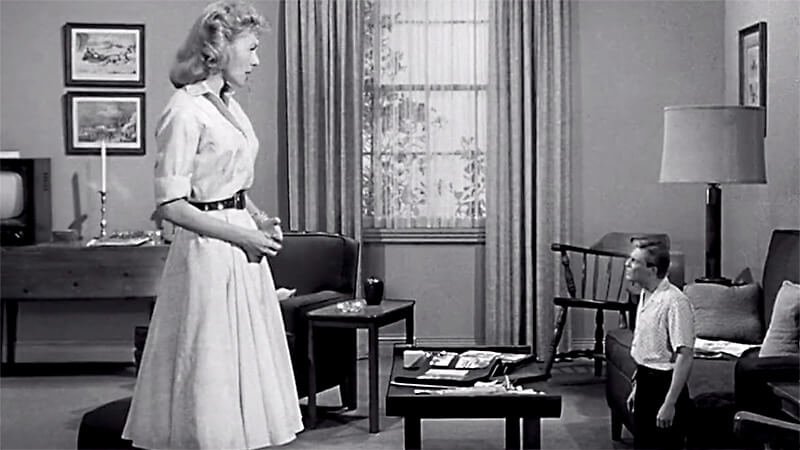Scott Carey (Grant Williams) is having a great day. He’s drifting on a boat in a calm ocean, enjoying the sun and the breeze, playing lovey dovey with wife Louise (Randy Stuart). Nothing to worry about except who’s going to fetch a cold beer. Well, almost nothing. What’s that misty cloud that passes over him while Louise is down below fetching the brews?
Six months later. Scott’s three inches shorter and 10 pounds lighter; it’s perplexing enough to send him to the doctor for a checkup. The doc figures it’s past mistakes in record-keeping. “People don’t get shorter, Mr. Carey. They just don’t get shorter.”
And yet he does. As Scott continues to shed inches and pounds, he’s referred to a research institute for examination and treatment. The doctors ask, has he ever been exposed to pesticides? Why yes, a few months ago. And how about radioactivity? Hmmm … could it have been that mysterious ocean mist? Yes! There you have it. Somehow the lingering radioactivity in his body activated toxins in the pesticide that generated this runaway transformation. He’s shrinking. Incredible.
As his condition worsens, Scott becomes bitter and sarcastic, and Louise suffers the brunt of his frustration. His discontent is further enflamed when his condition becomes public. The intrusive attention from the media and neighbors sends him into an emotional spiral.
Over time Scott springs back and forth between despair and hope. He meets a comely young dwarf women whose optimism inspires him. Then he plunges back into desperation when the antidote that stabilized him wears off and he’s shrinking again. Eventually he’s confined to a dollhouse in a corner of his living room, with wife Louise vigilantly looking after him. And here’s where the storyline transitions from science fiction intrigue to creature feature horror.
See It
Grant Williams does an outsized job portraying the luckless Scott Carey. He’s effective in early scenes where he’s perplexed and resentful about his condition, and he’s a believable Robinson Caruso when he strips down to fighting clothes and fashions the weapons he’ll need to stay alive in the basement. It appears he does a bit of his own rope-climbing. Solid enough work.
Likewise, Randy Stuart turns in a performance worthy of any devoted wife in a 1950s melodrama.
I have to make an observation to the effect that “the special effects are extraordinary and effective for their time,” but must acknowledge that’s unoriginal and obvious. There’s genuine ingenuity and skill in the set design and especially in the way separately filmed action sequences are synchronized and composited. Nothing is seamless to the modern eye, but it would be petty to try to find fault with the mechanics. Well done!
Director Jack Arnold deserves credit for creating a creepy vibe, especially in the latter half of the film when it becomes a fight for survival in the house’s cellar. You’ll recognize among his filmography some 50s classic thrillers, such as It Came From Outer Space (1953), Creature from the Black Lagoon (1954), and Tarantula (1955). Many aficionados of 50s science fiction consider The Incredible Shrinking Man the best of the bunch. (I also have a soft spot for his throw-away Peter Sellers comedy, The Mouse That Roared (1959)).
The film’s major weaknesses are intertwined. The bulk of the movie is Scott sharing his thoughts through voice-over, from the first frame to the last. So where/when was he at the moment he’s talking to us? The voice-over shouldn’t exist, but it must in order to construct a patchwork theme about … what? One could comment that “The Incredible Shrinking Man is a testament to human hope and resilience in the face of relentless adversity,” and that would sound fair enough. But then Grant’s concluding soliloquy, containing the script’s single reference to God, dangles some greater overarching message about “the riddle of the infinite,” a concept that pops out of nowhere in, literally, the final seconds.
The script was based on a short story by Richard Matheson, a renowned writer of horror and science fiction, the first of his work translated to cinema. The voice-over contains any number of memorably poetic lines, such as this, when Scott finds himself trapped in his house’s basement: “The cellar floor stretched before me like some vast, primeval plain. Empty of life, littered with the relics of a vanished race. No desert island castaway ever faced so bleak a prospect.”
The Incredible Shrinking Man is a perfectly enjoyable 50s science fiction and horror popcorn flick. It’s got some pretentions at the end, but it suffers in comparison with, say Invasion of the Body Snatchers, which the year before demonstrated how masterfully an intelligent blend of science fiction and horror could serve as insightful political allegory. So don’t put that burden of comparison on it. Just enjoy The Incredible Shrinking Man as an artifact of 50s science fiction: good fun, solid acting, fine writing, and splendid effects, stitched together with ideas that don’t warrant – or require – deep examination in order to appreciate.
